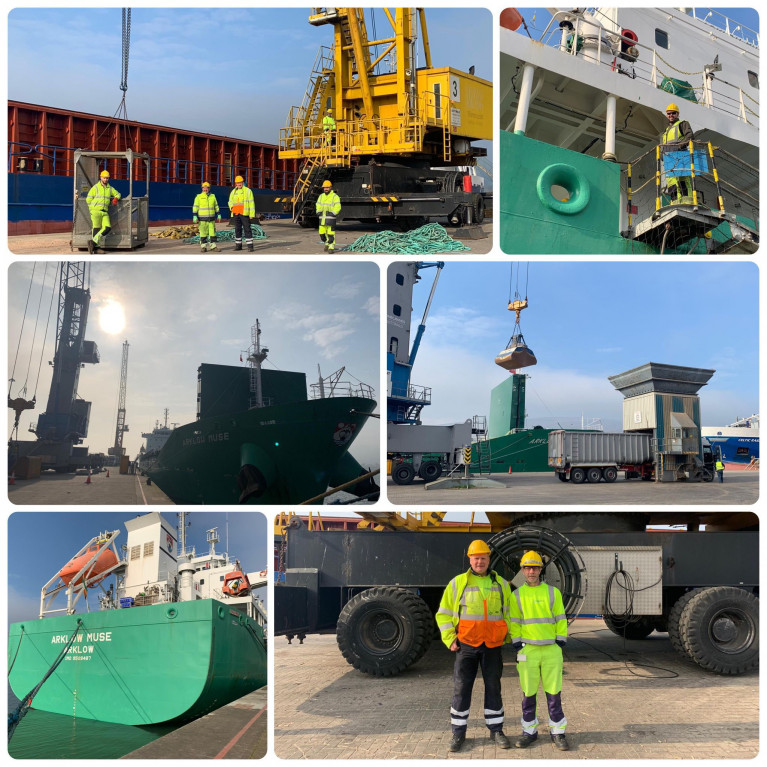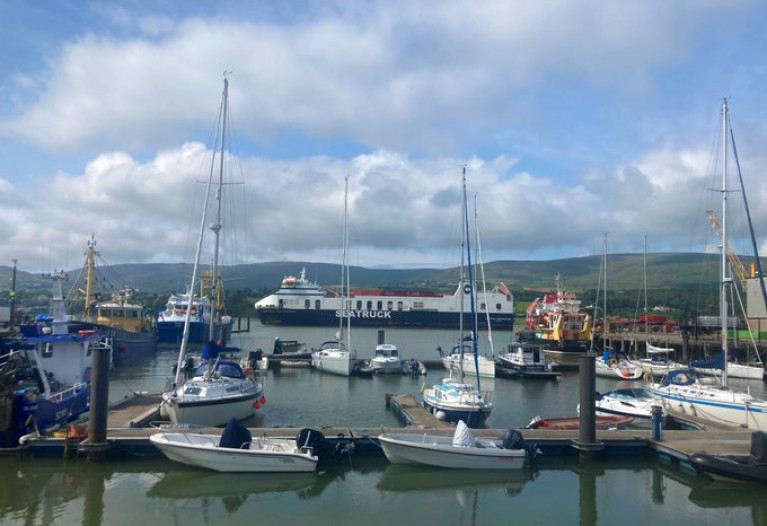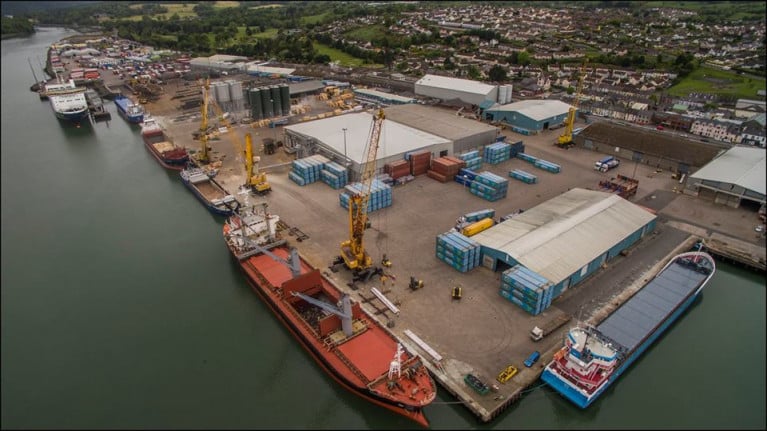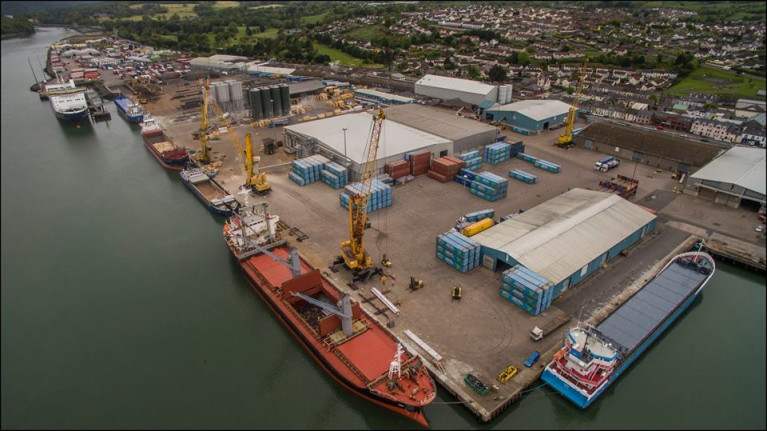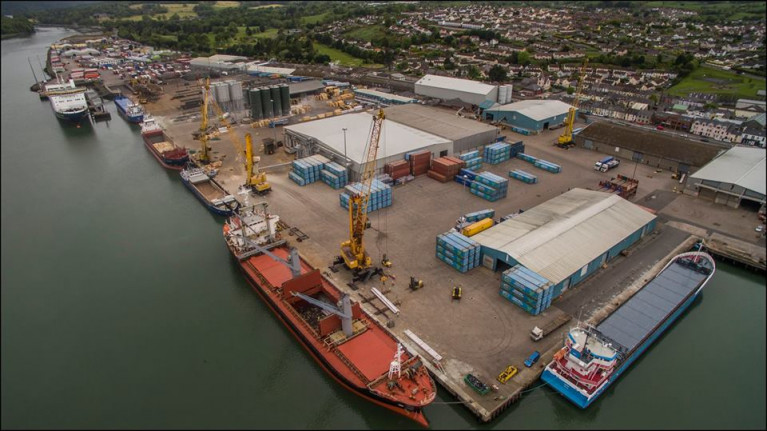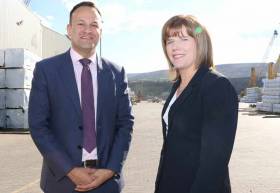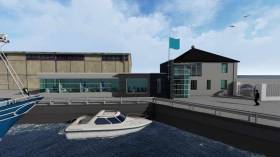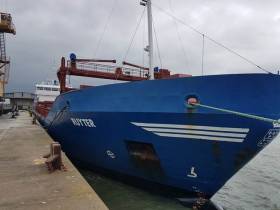Displaying items by tag: Warrenpoint
Warrenpoint to Welcome World’s Last Seagoing Paddle Steamer With First Carlingford Lough Cruise
PS Waverley, the World’s last seagoing paddle steamer will for the first time, it has been announced set sail for a cruise from Warrenpoint Harbour, Co. Down on Tuesday, 30th May.
Waverley will offer local people the unique opportunity to step aboard in Warrenpoint (as seen above, last year) for an evening sunset cruise, as the 700 passenger capacity veteran vessel steams down Carlingford Lough.
Since the announcement last week (Afloat adds, the cruise from Warrenpoint is fully booked) on the excursion that will also take in the coastline passing Kilkeel Bay to Russell’s Point.
Waverley’s General Manager, Paul Semple, commented, “I am delighted to announce that Waverley will be sailing from Warrenpoint for her first ever passenger sailing from the Port. I hope this surprise announcement will be welcomed by many as they will now get the opportunity to step aboard this famous ship. Waverley offers a truly unique experience with her powerful triple expansion steam engine and massive paddles, giving people the chance to sail on board for the first time on Carlingford Lough.
“Over the past few weeks, we have been in dialogue with the management team at Warrenpoint Harbour following Waverley’s fuel stop last October. When the suggestion was made that we could offer a cruise this time, the Harbour team were fully supportive. We look forward to bringing Waverley to the town and giving the public the chance to experience a trip aboard a paddle steamer.”
Waverley’s main summer season is spent operating a variety of traditional day trips from Glasgow and around the Clyde Coast and also England and Wales. The steamer has given occasional cruises from Belfast and further north from Red Bay, Co. Antrim in the past, but Warrenpoint has not been on the cruising schedule, until now. (Afloat adds, the paddle steamer for the first time called to the Republic at Dublin, Dun Laoghaire, etc with cruises in 1984 and a return to the Irish capital in 2001, see story).
David Holmes, CEO Warrenpoint Harbour said, “We are thrilled to be teaming up with the Waverley to offer this unique sunset cruise from Warrenpoint. As a commercial port, it is very seldom the opportunity presents itself to allow us to board passengers here, so this is very exciting for us. The cruise ship schedule last summer was very popular with the local community turning out to watch the ships coming in and out. We hope that Waverley will offer a tourism boost for the town coming on the back of the Blues on the Bay Festival, with an opportunity to eat in the town beforehand or stay over and enjoy the local hospitality afterwards.”
Waverley entered service in 1947 and was the last paddle steamer built for service on the Clyde, Afloat adds for operator London and North Eastern Railway. In the following year due to Nationalisation of Railways, the vessel became part of the Caledonian Steam Packet Company (CSP) until 1972, a year before the the company became Caledonian MacBrayne Ltd (CalMac).
Following a major public appeal, the Waveley re-entered service in 1973 after the vessel was gifted for £1 and officially handed over to Waverley Steam Navigation Co. Ltd., a company formed by the Paddle Steamer Preservation Society.
Since 1975 Waverley has carried over 6 million passengers and earned herself a loyal following in several areas around the UK including the South Coast and Thames. More recently in 2019 a public appeal raised £2.3m to replace the steam boilers and save the vessel from withdrawal.
The 623 tonnes steamer has a range of facilities including a self-service restaurant, bar lounges, tea bar and souvenir shop selling a wide variety of exclusive gifts. The main attraction is to watch the steam engine, which is open to full view, as it drives the ship’s paddles.
As mentioned above, tickets for the excursion operated by Waverley Excursions have since been sold out. (For more cruises operating elsewhere this season, click here).
The Waverley's once-off cruise from Warrenpoint Port is to start at 7pm with the steamer returning at 10pm.
Access to the ship will be via the Town Dock office at Warrenpoint Square. Please note there will be no access via the main port entrance.
Warrenpoint Port Welcomes Seatruck Ferries Acquisition Announcement
Operator Seatruck Ferries announced last week that, subject to regulatory approval from the Irish competition authorities, it is to be acquired from Clipper Group by CLdN.
CLdN, headquartered in Luxembourg is one of Europe’s leading multimodal logistics providers with three divisions CLdN RoRo, CLdN Cargo and CLdN Ports.
Seatruck operates a daily ro-ro (roll on roll off) ferry service from Warrenpoint Port to Heysham, specialising in primarily unaccompanied loads. This model increases efficiency both from an environmental and an operational perspective.
Seatruck, operational since 1996, was acquired by Clipper in 2002. It currently owns eight purpose-built ro-ro vessels of which six are operating on the Irish Sea and two are on charter.
David Holmes, CEO Warrenpoint Port said, “We would like to congratulate the Seatruck team on their acquisition. CLdN is a leading name in the maritime sector, and it is fantastic to now have the brand operational in Warrenpoint. We are delighted to say that for service users, it will be ‘business as usual’. Nothing will change, the Seatruck brand will be retained and the team will continue to be led by Alistair Eagles.”
David continued, “Seatruck has been operational at Warrenpoint Port for 20 years’, providing a vital service for Irish Sea traffic. In more recent years, with increasing costs, the unaccompanied trailer model, has become particularly attractive for haulage companies and logistics providers. We look forward to continuing to drive growth and to building on the strong foundations of our relationship with Seatruck, under their new ownership.”
CLdN and Clipper Group have agreed not to disclose the transaction price.
Afloat.ie adds that Seatruck operate additional Irish Sea routes: Dublin-Heysham and Dublin-Liverpool which are also part of the transaction. Combined the three routes transport close to 20% of the region’s seaborne cargo volumes.
Tonnage Up 12.6% at Warrenpoint Port Reflects Record Year
Details of Warrenpoint Port's performance for the year ending 31st December 2021 have been released by the Co. Down port.
In a year which brought exceptional challenges, not least in relation to Covid-19 and Brexit, the Port continued to experience unprecedented demand. In 2021 overall tonnage was up 12.6% compared to 2020, with vessel calls up more than 14% and containers up more than 16%.
This has come on the back of 2020 being an extraordinary year, with Covid driving a 20% reduction in volume compared to 2019 in the first half of the year. As restrictions eased, there was a significant, concerted effort in the second half of the year, to reduce this deficit to (-4.2%) on 2019 volume.
Warrenpoint Port now handles circa 12% of Northern Ireland’s port activity, with 51% export and 49% import in 2021. This is a shift for the Port over last two years as historically it would have been a net importer.
- Overall tonnage up 12.6% YoY
- Vessel calls up more than 14%
- Containers up more than 16%.
David Holmes, CEO Warrenpoint Port said, “2021 was another extremely challenging year. Our team were tested to the limits in terms of Covid-19 and in delivering to meet demand throughout the restrictions. We would like to thank our team for all their efforts.
“We recorded a tremendous year with Warrenpoint Port really delivering as an economic driver for the region and offering resilience in the regional infrastructure network outside of Belfast. The Port has put more than £10m GVA back into the local economy in the last 12 months. With a recruitment drive in 2021 the fulltime team has increased to more than 70 and indirectly generates more than 400 additional jobs through Port activities.”
David Holmes continued, “All commodities and formats showed strong favourable growth while support from Department of Infrastructure in 2021 allowed the Port to invest in Covid safety measures and equipment. This greatly benefited the productivity capacity at the site during the pandemic.”
In 2021, the Port continued its investment in and outreach to the local community. It hosted a Big Spring Litter Pick, supported local initiatives including a water safety campaign for young people and a fundraising activity for local walking group, the Hiking Hens.
The Port hosted its second annual Community Christmas Fund, raising more than £22,000 which has been distributed to 43 different local organisations. This brings the total raised over the last two years to more than £34,000. The Port continues to drive its ‘open door’ policy with quarterly community ezines called ‘On Board’ and quarterly meetings with locally elected representatives.
The appointment of two non-executive members to the board of Warrenpoint Harbour Authority (WHA) has been announced by Infrastructure Minister Nichola Mallon.
Minister Mallon said “I am pleased to announce a first term appointment for Fiona Hanna and a second term appointment for Richard Johnston.
“Warrenpoint Port has ambitious development plans which will provide support as it recovers from the pandemic and takes advantage new of opportunities, as well as supporting the local economy and providing opportunities for growth.
"The Port will also have a focus on working with stakeholders and partners in bringing forward important strategic projects such as the Narrow Water Bridge and the Southern Relief Road. I am confident that the experience Fiona and Richard bring, will be of considerable value to the Board in the years ahead”.
On 1 August, the appointments had come into effect and will be for a maximum of four years.
The appointments have been made in accordance with the Commissioner for Public Appointments for Northern Ireland’s Code of Practice.
Warrenpoint Harbour Authority Allocated £1.5m for Infrastructure
Warrenpoint Harbour Authority has been allocated £1.5m by Nichola Mallon, Northern Ireland's Minister for Infrastructure.
The funding will allow the Co.Down authority to take forward a programme of port infrastructure works.
Minister Mallon said: “The Harbour Authority has identified a range of infrastructure works required at the port as a result of the challenges arising from the Covid-19 pandemic.
This funding will therefore provide vital support following a difficult year for the port, and will enable it to work towards economic recovery as we emerge from the Covid-19 pandemic.
I am pleased to be able to support Warrenpoint Harbour Authority with this bid and to provide support as the port adapts to the requirements of future business needs.”
David Holmes, CEO, Warrenpoint Port said, “We have been working closely with DfI, and our local representatives in relation to our Brexit and Covid response. We are pleased to confirm this award. We see it as a measure of the Department’s confidence in and commitment to the Port.
“The last 12 months have been challenging for all sectors. We would like to thank our team in particular, for their unstinting support in their role as key workers throughout the pandemic. We look forward to progressing the opportunities that we are working on in 2021. Please all do stay safe during these continuing difficult times.”
Brexit means physical checks are required on certain goods entering the UK from the EU.
Tonnage details for Warrenpoint Port during 2020 have been released which show they have held up significantly.
Figures were down by less than 5% on 2019 volumes and only 0.9% behind pre- Covid expected volumes. This is despite the lockdown and a complete drop off in volume for part of the year.
The robust figures have been attributed to several factors: – including a strong relationship with existing customers, an investment in the Port team; and a focused effort by hauliers to front load prior to Brexit and to find routes that minimise disruption, post Brexit.
The Co. Down port is Northern Ireland’s second largest port by volume.
It is almost 250 years since the port became into existence and later this year the Warrenpoint Harbour Authority is to celebrate a 50th anniversary.
Waste to Energy Firm Renews Long-Term Licence with Warrenpoint Harbour
Headquartered in Newry, Co. Down is Re-Gen WTE (Waste to Energy) Ltd which has agreed a new long-term licence with Warrenpoint Harbour Authority (WPHA)
The company, The Irish News reports, which specialises in covering energy from rubbish that normally ends up in landfill, will use the port to export its refuse derive fuel products.
Based in the Carnbane Industrial Estate, Re-Gen currently processes around 200,000 tonnes of waste at its facility every year.
A sister company of Re-Gen Waste Ltd, which employs 240 people, the WTE division is among a series of Re-Gen subsidiaries that spans the engineering and transport sectors.
The company operates its purpose-built installation 24 hours a day and has processed nearly two million tonnes of household waste to date.
Click HERE for more on this development.
Taoiseach Told Warrenpoint Port Wants 'Frictionless Border'
Warrenpoint Port, the second largest port in Northern Ireland and the fourth biggest on the island of Ireland, used a meeting with Taoiseach Leo Varadkar today to impress on him the need for a frictionless border during Brexit negotiations. But Port CEO, Clare Guinness, also said the port is 'actively formulating plans to deal with whatever scenario results from the Brexit negotiations'.
Situated almost directly on the border between the UK and the Republic of Ireland, Warrenpoint Port last year handled 3.56 million tonnes of cargo worth £6.2 billion, around 40 per cent of which either originated from or was destined for the Republic of Ireland.
Guinness said the meeting provided a welcome "opportunity to meet with the leader of our closest trading partner who is one of the leading figures in the Brexit negotiations".
As Afloat.ie recently reported, Warrenpoint Port has unveiled a major 25-year growth plan as it forecasts a continued growth in trade following Brexit.
"Warrenpoint Port last year handled 3.56 million tonnes of cargo worth £6.2 billion, around 40 per cent of which either originated from or was destined for the Republic of Ireland"
“We used today’s meeting to press on Mr Varadkar, our desire for a border that supports frictionless trade, ensuring that it can continue to flow and grow. While this is our preferred position, we are actively formulating plans to deal with whatever scenario results from the Brexit negotiations.
“We also highlighted the need for improved infrastructure in the border region which would help trade north and south, in particular, the delivery of the Southern Relief Road which has already benefitted from European funding through the feasibility phase.”
Warrenpoint Harbour Authority was created as a Trust Port by legislation in 1971.
In 2017, the value of goods moving through Warrenpoint Port was £6.2billion, £164 million of which was direct international trade. The Port handled 3.48 million tonnes
of cargo in 2016 increasing to 3.56 million tonnes in 2017
The port employs 67 staff directly, but more than 200 people work at the harbour every day.
In addition to serving the markets in Great Britain and the Republic of Ireland, the Port deals with imports and exports from countries and regions across the world including to Spain, Italy, Sweden, Belgium, Germany, Ukraine and the Americas.
Warrenpoint Port Masterplan Includes Expanded Marina
Warrenpoint Port has unveiled a major 25-year growth plan as it forecasts a continued growth in trade following Brexit.
The Masterplan document, which covers 2018-2043, aims to build on the port’s position as the second largest port in Northern Ireland and as a major economic driver for the region.
The Port is a vital link in the supply chain for numerous businesses. It has the capability to handle a broad spectrum of goods including grain, timber, steel and cement and a full range of services including container and freight. Authorities at the Port, are anticipating a significant increase in trade over the coming decades with core roll on, roll off, freight expected to rise by up to 80% by 2040.
The draft document outlines key objectives including upgrading transport links to the Port, improving Port capacity and facilities, maintaining and growing its customer base and developing improved linkages with Warrenpoint town.
It identifies several key priorities to achieve these including:
Delivery of the Southern Relief Road
Redevelopment of the Town Dock in Warrenpoint Town Square
Providing open public access to an expanded Marina.
Clare Guinness, CEO, Warrenpoint Port said:
“Warrenpoint Port is enjoying a sustained period of growth resulting in record trade figures over recent years. In 2017, we handled 3.56 million tonnes of cargo worth £6.2 billion.
“Our draft Masterplan sets out a vision to continue that growth as we aim to maximise our contribution to the regional economy and community.
“It has been prepared during a period of some uncertainty and is designed to prepare the Port and the surrounding area to deal with Brexit and other upcoming challenges.
“Working with our key stakeholders including Newry, Mourne and Down District Council, government agencies, Newry Chamber of Commerce and the local community, the Masterplan will help us further accelerate the growth of the Eastern economic corridor and beyond, whilst remaining acutely aware of our responsibilities as custodians of the marine environment.”
Liam Hannaway, Chief Executive, Newry, Mourne and Down District Council, said:
“Warrenpoint Port’s draft Masterplan provides a welcome overview into the medium and long term objectives of one of the most important employers in the Newry, Mourne and Down district.
“The Port is a huge part of the local economic success story and, as one of its key stakeholders, we look forward to taking part in the consultation into the plans.”
Paul Convery, President, Newry Chamber of Trade and Commerce, commented:
“As a key driver for economic prosperity, the region benefits greatly from having Warrenpoint Port on our doorstep.
“We are delighted to see the Port’s ambitions to grow further and share many of the aspirations included in the Masterplan including the prompt delivery of the Southern Relief Road.”
The Masterplan is available to view at www.warrenpointport.com while two Public Information days will be held at Town Dock House, The Square, Warrenpoint on 2nd and 3rd May. The consultation runs until Friday 18th May.
Captain Fined Over Negligence After Cargo Vessel Grounding
#Shipping - The captain of a cargo ship that ran aground on Rathlin Island last week has been fined £1,000 over his negligence at the helm, as the Belfast Telegraph reports.
The MV Ruyter, which was en route from Russia via Denmark and Scotland, sustained extensive damage to the front of its hull after running aground on the north side of Rathlin Island on the night of Tuesday 10 October.
However the damage was not noted till the vessel arrived at Warrenpoint in Carlingford Lough the following afternoon.
At a sitting of Armagh Court, Judge Paul Copeland found that Aleksandr Iakovotsov had broken international shipping codes over failure to keep a lookout to judge risk of collision, and a separate charge of failing to provide sufficient lookout “during the hours of darkness”.
The Belfast Telegraph has more on the story HERE.


























